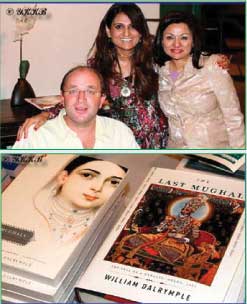White Mughal Comes to Los Angeles
Report and interview by Anila Ali
Pictures by YKKB

 Pictures above: Glimpses of the event. In the second row picture the interviewer and the interviewee are seen with a guest
Pictures above: Glimpses of the event. In the second row picture the interviewer and the interviewee are seen with a guest |
March 29th was a very exciting day for the Council of Pakistan American Affairs (COPAA) and Pakistan Arts Council. They were hosting a Book Talk by William Dalrymple, a prolific historian who has made major contributions to the literary studies of the Indian Sub-continent. He was on a tour of the US and Canada to talk about his new book, “The Last Mughal,” a sequel to “White Mughal”.
Dalrymple walked into the auditorium full of fervent fans who had read the mesmerizing tale of the love affair between James Achilles Kirkpatrick and Khair-un-Nissa, the great niece of the Prime Minister of Hyderabad. Now the fans waited to hear about the downfall of a great leader, Bahadur Shah Zafar.
Atiya Khan, the President of Pakistan Arts Council, warmly welcomed the audience and then invited COPAA secretary, Ismail Keekeebhai, to introduce William Dalrymple. Ismail spoke of the historian’s in-depth knowledge of the Islamic and Indo-Pak cultures, and his love for the magnificent Mughal period that was vividly evident from his work. He thanked Anila Ali, COPAA board member, for her untiring efforts to organize this event in collaboration with PAC.
Dalrymple began his talk with a magnificent picture of the Last Mughal in all his glamour and glory and ended it with a picture of him looking old, gaunt, helpless, and forgotten.
Those who have read The Last Mughal agree that Dalrymple’s account of the fall of the Mughal dynasty in India is thorough and extremely well researched. What makes it so objective is that it includes perspectives from both British and Indian sources. Dalrymple narrated the entire story of the fall of this great empire, beginning with the greatness of the empire, its almost utopian governance, the lack of bigotry, its acceptance of all cultures and then the advent of the British, history of the uprising and complete destruction of Delhi, and lastly the fall of a great dynasty. The audience went through an emotional roller coaster - from wonder to disbelief, from sadness to grief all in the span of an hour.
“It caused me to reflect on the fall of Saddam’s regime, and how he looked so hapless at the end,“ explained a listener.
At the end of the presentation, the audience rose to applaud the historian and flocked around him to get their books signed.
I got a chance to interview William while he was in Orange County, meeting Pakistanis. I was utterly amazed at his store of knowledge and his ability to relate it in such a casual conversational manner. Being such a celebrated writer, I was expecting Dalrymple to be very reserved and somewhat egotistic; it was quite the contrary. As someone remarked: “He is so knowledgeable and so down-to-earth. He seems to know us better than we know ourselves.“
Q. What inspired you to write about the last Mughal?
A. As a writer you’re always looking for two-three things: an interesting story, one that’s been told well, and one in which there are new documents that may throw new light on the story.
With this story, I knew that there was a stash of fantastic documents in the National Archives which no one had ever used.
Q. Is The Last Mughal a sequel to White Mughal?
A. It was a thematic sequel to the White Mughal. While White Mughal was all about this extraordinary forgotten period where one in three Brits was married to Indian women, The White Mughal was an amazing story of marriage between cultures and religions; The Last Mughal was the story the divorce.
Q. What are your impressions of the Pakistani community in Los Angeles and Orange County?
A. I had no idea there was a Pakistani community but I also wasn’t aware that there was an equally prosperous Pakistani community. The West Coast Pakistani community seemed the Dubai, women with Chanel and Gucci sunglasses, men with big cars; seemed very prosperous indeed.
I would say it’s a great model of successful immigration and acculturation to American culture and tradition.
Q. Any advice for our community?
A. Difficult to offer advice; I suspect, the answer to successful immigration is to get right the balance of pitching into the host culture to make success and yet maintaining what is important of your own culture.
No doubt after 9/11, the path the British Muslims have taken, turning up outside rallies wearing suicide bomber jackets and sympathizing with Taliban, and suicide bombers, wearing clothes and beards which play up all the prejudices, these can only damage things. Attaining real political power and educating children is a great model for the Muslims to follow.
Q. What do you make of the new political dynamics of Pakistan?
A. Of all the various things one of the things that is a safer bet is that Zardari has made extremely conciliatory noises. He is eager to negotiate, he is not prepared to let Kashmir come between good relations with India, which he regards crucial to the future of South Asia.
I think the economy of South Asia is on such an upswing; it’s going to take very bad management to screw it up. Even a moderate government should find it easy to keep it growing at a good rate.
But an unknown quantity remains, the honesty and integrity of the Pakistani elected representation. Whether they’ve learned anything from the past has yet to be seen; if they use offices for personal enrichment then Pakistan is in for a very rough ride indeed.
-------------------------------------------------------------------------------------

